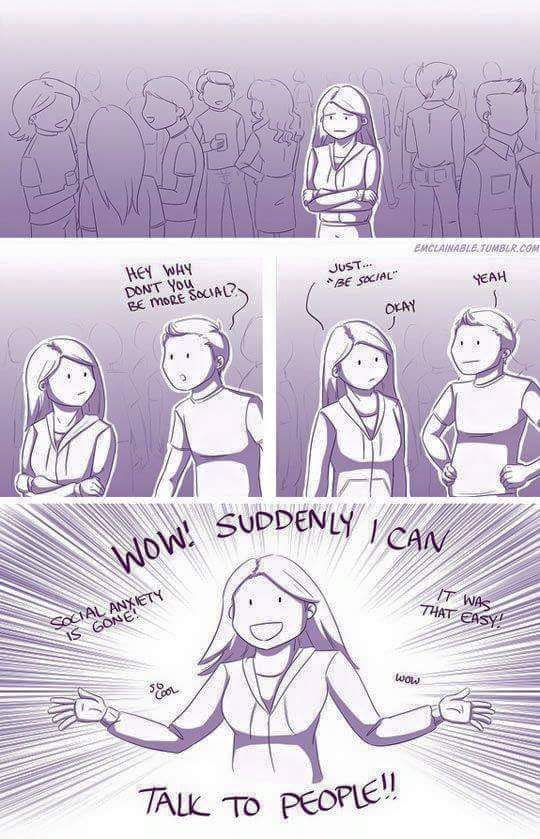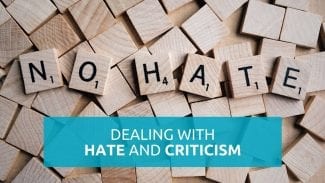Over the years I’ve read so much terrible advice on how to improve socially.
It’s not just that it doesn’t help – it can even make you worse off and hurt your social life.
Here are some of the worst ones:
“Just be more social”
This one is so stupid it’s almost funny. But instead of me ranting about it, enjoy this strip:

[Here’s some advice that actually does work to be more social.]
Here’s another one:
“When you’re in a social setting, just remember to A, B, C, D, E. Also, you need to avoid to F, G, H, I…”
Do you know what the most surefire way is to become more self-conscious and nervous in social settings? Answer: Trying to remember a bunch of things you should and shouldn’t do.
Instead of trying to remember 100 different things, you want to focus on one thing at the time, starting with the most powerful one. That’s how we’ve designed Awkward to Awesome. We focus on one core concept and help you internalize it. Then, you’re able to learn more advanced techniques on top of that, when you already have a solid foundation.
“Just speak your mind”
The core of this advice is good. When people are anxious they tend to filter themselves too hard. But it won’t help to “just speak your mind”. You might end up saying some offensive things. I’ve done it myself, it did not work out that well :).
We discovered that to tackle this problem of over-thinking, we had to start at a whole different end: Learning to feel more at ease in social settings FIRST. When our beta testers got that handled, they were able to adjust their filter and speak their mind (without speaking before thinking). It turns out, it’s not that much about learning a technique. It’s more about learning to feel at ease. That’s when your brain works the best and problems like overthinking and filtering self-correct.
“Just memorize these scripts and questions”
Having a few questions to fall back on can be great if the conversation dies out and your mind goes blank. But most of the examples I’ve heard will make you sound like a weirdo.
Also, socializing isn’t about being a weird pickup person who communicates through canned lines.
Take this one for example:
“Just ask people you meet: What’s your personal passion project?”
Ehh, who talks like that? It’s great to find out people’s passions, but if you use a canned question like that you’ll freak people out.
Then there are questions that actually DO work to fall back on when a conversation dies out. My favorite is “Did you hear that [insert anything newsworthy you recently read]?.”
“Use self-affirmations”
You know this whole thing of putting up posters on the bathroom mirror saying “You’re valuable”? It’s not just that it doesn’t work; like this study shows, it can even make you worse off!
(I’ve written here about how to actually improve your self-esteem.)
“Just be yourself”
What even is “yourself?”. Is it the happy you, the serious you, the energetic you or the calm you? When people give that advice, what they probably mean is “don’t play the role of someone you don’t want to be”. But that’s obvious and not helpful.
I know people giving advice like this mean well, but it does more damage than good.
Read more: How to be yourself in social setting with DETAILED instructions.
What is the worst advice YOU’VE heard? And on a more positive note, what’s the most helpful advice someone ever given you? Let me know in the comments!



It’s refreshing to come across a blog every once in a while that isn’t the same rehashed material. Fun read.
Hi dave, thanks for this lesson, my question to you is: when meeting someone for the first time can bragging make someone you socialising with loose interest on you?
One sales job I had told me to find something authentic to compliment the person on. I’ve always found that works amazingly well.
That’s a good one!
Thanks for the article David. The cartoon made me laugh. I agree with all the examples you mentioned.
The most well-intentioned bad social advice I’ve received is “People enjoy talking about themselves so just ask them questions”. This sounds very logical but it’s hard to do when I’m anxious or in a nervous state. The first question I ask may be extremely awkward, and it starts the entire social interaction off on the wrong foot and turn into an interrogation.
A better advice might be “only ask questions in which you are interested in knowing the answer and also be prepared to answer my own question if the same person asks it back”.
Hi David! (So solipsism-inducing when you share name with the first commenter)
Great one! Yeah, you can expect to get your questions asked back!